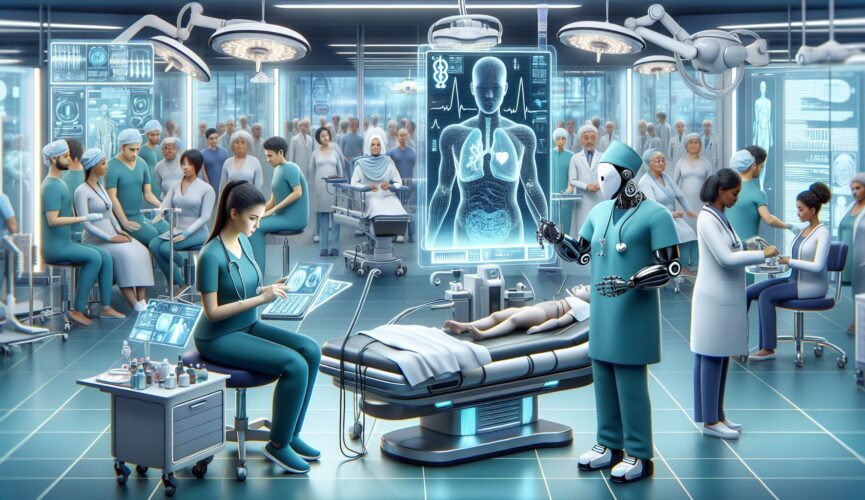Imagine a world where diseases are diagnosed and treated at their earliest stages, where patients can receive personalized care tailored to their unique genetic makeup, and where medical professionals have access to an unprecedented wealth of information and resources. Thanks to the seamless integration of technology and medicine, this vision is becoming a reality.
The Power of Big Data
With the advent of electronic health records, wearable devices, and advanced diagnostic tools, the healthcare industry is now generating massive amounts of data. What was once an overwhelming burden has now become a valuable asset thanks to the power of big data. By applying machine learning and artificial intelligence algorithms to this wealth of information, healthcare providers can identify patterns, predict outcomes, and make informed decisions that lead to better patient outcomes.
Precision Medicine
Technology plays a significant role in the emergence of precision medicine, an approach that considers individual variability in genes, environment, and lifestyle for each patient. Through the use of genetic testing, physicians can now identify genetic variations that predispose individuals to certain diseases. Armed with this information, healthcare professionals can create customized treatment plans, reducing adverse drug reactions and improving treatment effectiveness.
- https://www.opendata.nhs.scot/fr/user/acheterpriligysansordonnance
- https://www.opendata.nhs.scot/fr/user/acheterlevitrasansordonnance
- https://www.opendata.nhs.scot/fr/user/achetertadacipsansordonnance
- https://www.opendata.nhs.scot/fr/user/achetermodafinilsansordonnance
- https://www.opendata.nhs.scot/fr/user/acheterarmodafinilsansordonnance
- https://www.opendata.nhs.scot/fr/user/achetermethylphenidatesansordonnance
- https://www.opendata.nhs.scot/fr/user/acheterstratterasansordonnance
- https://www.opendata.nhs.scot/fr/user/acheteratomoxetinesansordonnance
- https://www.opendata.nhs.scot/fr/user/acheterventolinsansordonnance
- https://www.opendata.nhs.scot/fr/user/acheteralbuterolsansordonnance
- https://www.opendata.nhs.scot/fr/user/acheterdoxycyclinesansordonnance
- https://www.opendata.nhs.scot/fr/user/acheterazithromycinesansordonnance
- https://www.opendata.nhs.scot/fr/user/acheteraripiprazolsansordonnance
- https://www.opendata.nhs.scot/fr/user/acheterprozacsansordonnance
- https://www.opendata.nhs.scot/fr/user/acheterfluoxetinesansordonnance
Telemedicine: Breaking Down Barriers
Distance and geography are no longer barriers to quality healthcare with the introduction of telemedicine. Patients can now conveniently consult with specialists via video calls, eliminating the need for lengthy travels and reducing healthcare costs. Additionally, telemedicine enables remote patient monitoring, where healthcare providers can keep track of patients’ vital signs and provide proactive care from afar. This technology not only benefits individuals in remote areas but also allows for continuous monitoring of chronic conditions, resulting in early intervention and prevention of complications.
Surgical Advancements
Technological breakthroughs have revolutionized surgical procedures, making them safer, more precise, and minimally invasive. The use of robotic-assisted surgery, for example, provides surgeons with enhanced vision, precision, and control, resulting in improved outcomes and shorter recovery times for patients. Furthermore, cutting-edge imaging technologies such as magnetic resonance imaging (MRI) and computerized tomography (CT) scans enable physicians to accurately visualize and diagnose conditions, guiding them in planning and executing complex surgical procedures.
Ethical Considerations
While the fusion of technology and medicine brings about numerous benefits, it also raises ethical concerns. Privacy and security of patient data, for instance, become of utmost importance, ensuring that sensitive medical information is protected from unauthorized access. Moreover, the potential for bias in algorithms used in diagnosis or treatment recommendations must be addressed to prevent disparities in healthcare delivery.
In conclusion, the integration of technology and medicine has the potential to revolutionize healthcare as we know it. From big data analysis to precision medicine, telemedicine to surgical advancements, the benefits are vast and transformative. However, it is crucial to address ethical considerations to ensure that technology is deployed responsibly, prioritizing patient welfare and equitable access to care. The future of healthcare is here, and it is powered by technology.
